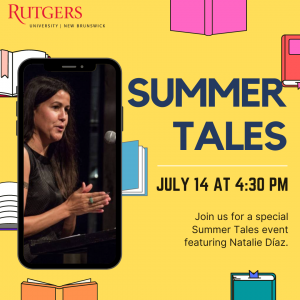Possession can take many forms. The ownership of things, for example. I think back to the time we moved into our rented duplex in England for a two-year expat assignment. Even though we had put a large portion of our items in storage, we still had a full container of belongings that made the long journey across the ocean. It made me realize … do we really need all this stuff?

Our guest at Summer Tales
Then there’s territorial possession, a theme highlighted in Simon Winchester’s book Land: How the Hunger for Ownership Shaped the Modern World. Winchester discusses how land is a precarious, ever-changing reality, having been stolen, purchased, defended and damaged by human activities. Land has played a big role in cultural clashes, and Winchester does not mince words describing social injustices such as the horrendous treatment of Native Americans by other nations who came and claimed their land, including cruel policies such as “Indian removal” and the infamous westward passage known as the Trail of Tears.
Native Americans, by and large, didn’t believe that anyone “owns” the land––it is there to nurture us all. Yet this lack of empathy and understanding for the indigenous culture and society continues today, underscoring the fact that possession can also happen to people. This is a connection I made reading Natalie Díaz’s poem “My Brother at 3 a.m.” Featured in her debut book of poetry, When My Brother Was an Aztec, it details how she views and deals with her brother’s struggle with drug addiction, under the veil of their life on a reservation and Mojave cultural obligations.
To me, the devil in the poem was the addiction trying to possess her brother. He doesn’t want to give in, but it continues relentlessly until he cannot stop it. Even his mother’s strong love can’t pull him away. Díaz conveys this feeling of desperation and despair with vivid imagery (“The sky wasn’t black or blue but the green of a dying night”) and the repetitious poetic technique anaphora (“Stars had closed their eyes or sheathed their knives”), sometimes juxtaposing just one or two words to create a slightly different mood. I felt it was a metaphor for both how the Mojave have been treated as a society and the recurring issue of substance abuse. The result is a poem that is haunting, lyrical, and unforgettable, taking its own “possession” over the reader.
Meet the author on Wednesday, July 14, 2021. Natalie Díaz will be the guest of the Summer Tales Books Club. The event is free and open to the public, but registration is required.